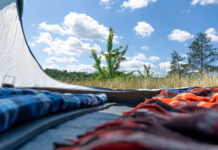 Name: Neil Crowley
Name: Neil CrowleyYear: Senior
Major: History, Anthropology
Area of Study: Russian Area Studies
Country: RussiaI always had wanted to weather a Russian winter. For some reason, I thought doing so would give me an insight I lacked—considering I have spent my entire youth in Southern California. However, it turns out winters here aren’t as severe as in the Midwest. But it’s the combination of short daylight hours, wind chill and the dampness that gets to you.The place I live, Vasilievsky Ostrov (the largest island of the couple dozen in the Neva River delta on which St. Petersburg is built), gets the wind right off of the Gulf of Finland. This makes walking to to Primorskaya metro in the morning tough, because not only is it cold, but there are also sheets of ice that cover everything. I know I’m painting an illustrious picture of why people here are said to never smile; however, I wouldn’t have it any other way—St. Petersburg is simply amazing, and my EAP Study Abroad experience here has fostered an incredible amount of personal growth.This city is rich in history; so much so that it is the unanimously recognized cultural capital of Russia, and the entire center of it was declared an UNESCO World Heritage Site. It’s here that there is a starkly Europe-Meets-Russia feel—Soviet apartment complexes surrounding a center of some of the most beautiful palaces in the world. One can’t walk a block without being in view of a massive palace or a beautifully ornate church. It’s a city filled with more museums than one can count, and the most impressive collection being in the Hermitage museum housed in the Russian Winter Palace on the banks of the Neva River. And on any given day, there are performances of all kinds: from ballet, opera, and classical, to rock, rap and DJs.In contrast to the elegant architecture, there is an essential roughness to living here—Russia, at times, can appear as if the Soviet Union never fell. The Metro lines are the heart of this city; they can take you from one side to the other in half an hour. However, it is on the metro that one gets the feel of how things really are—crowded. Piles of people herded on to and off of trains, escalators, in and out of doorways; there is precious little consideration for personal space. Acts of kindness are reserved for those you know and those for whom you have time. But even though the public sphere may appear harsh sometimes, I assure you that after getting to know people here, I’ve realized that they are some of the most genuine people I’ve ever met, and we’ve forged some of the strongest bonds. It takes one Maslenitsa festival to watch the entire tone of the culture change from cold to warm, with parents and children sledding around parks.
As for the Study Abroad program itself, I recommend it highly. Instead of learning Russian history in Southern California, I am instead learning it on the grounds of the impressive Smolny Cathedral at the same institution in which Lenin and Trotsky studied. Instead of reading online about the 2012 Russian presidential elections, I was here while they were going on; protests, anti-protest protests, propaganda—I witnessed the entire process first-hand while taking classes on it. And there is simply no better way to learn a language than full immersion—being forced to speak Russian has improved me in a short month to the point where I can hold conversations with locals.
I cannot stress enough the advantages of participating in a Study Abroad program – the way it looks on a resume and its comparable price to being at UC Riverside should make it a simple decision for most. It may take a leap of faith to extend oneself outside the safety of being in a country that speaks English, but in just crossing the border into Russia, this has opened up an entire other world—I feel like the country is no longer a distant idea, but a firm reality, something I know and am familiar with, something ultimately accessible.








